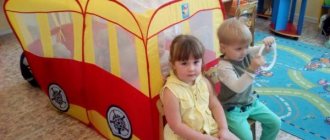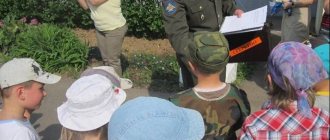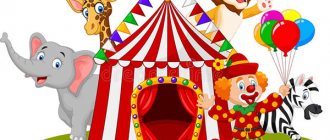Goals of didactic games according to the Federal State Educational Standard
A didactic game is an effective element of the system of comprehensive personal development of a minor. Game material is an important part in the implementation of the tasks of the Federal State Educational Standard, as it contains cognitive and educational components.
Didactic games are applicable for the physical, intellectual, social development of the child, moral, aesthetic and labor education. Their goals:
- broadening your horizons, gaining knowledge about the world around you;
- acquiring communication skills, productive interaction, finding mutual understanding;
- formation of social adequacy, the ability to behave correctly in different situations;
- development of imagination and creative skills;
- expansion of individual vocabulary;
- development of speech skills, consolidation of grammatical and lexical norms of communication;
- improvement of articulation, general physical training;
- development of logical thinking, ability to analyze;
- obtaining basic mathematical, philological, natural science knowledge;
- development of concentration, reaction speed, visual and auditory perception.
Children's quiz game for intelligence development
New Year's Quiz
If the game is organized at a celebration dedicated to the New Year, then holding an original quiz for children is what you need. You can find suitable questions on the Internet or create them yourself.
Quiz on Russian literature
If you organize a quiz at school, then you can time the game to coincide with one of the lessons. Literature is ideal. You can come up with questions based on famous works or poems.
Math quiz
Coming up with several rounds of a math quiz for children means giving them the opportunity to stretch their brains and use all their skills in solving puzzles and charades.
Quiz on films
One of the most popular quizes, where some of the questions are video materials with clips from films. Rest assured that this version of the quiz will help your child develop skills in visual perception of questions and improve memory.
Quiz on Tik Tok
Don't think that Tik Tok only entertains children. You can make an excellent quiz out of it, which will help your child develop intellectual and mental skills. To make it easier to find suitable questions, look for them on the Internet.
Didactic games in the middle group according to the Federal State Educational Standard
In the middle group, it is important to socialize preschoolers with the help of games and expand their understanding of the world around them. It is necessary to pay attention to the physical and emotional improvement of the individual, the development of observation, the ability to concentrate, to react correctly and quickly to events and other people.
Good wizards
For the game, prepare a “magic” wand, decorate it with paints or sparkles. Pupils sit in a circle. Tell them that the wand turns everyone who takes it into a kind and friendly person.
During the game, children take turns taking a stick, calling a friend sitting next to them a pleasant and affectionate adjective, then passing the “baton” to him. The game ends when all participants receive positive epithets.
Broken phone
This game, which develops auditory attention, has been played by many generations of children.
Children sit down or stand in a row. The first player whispers a certain word in the ear of the second. The second whispers to the third, and so on. The last player in the row says the word he hears out loud. If it matches what the first participant said, it means the stage was a success and the game continues. If the word turns out to be incorrect, all players, starting with the second to last one, say out loud what they heard from the previous participant. In this way, it is possible to find out who the “damaged phone” is, who heard the word incorrectly. The guilty one becomes the last in the row.
What do the animals say?
For an educational game you need a ball. Line up the students in a row and stand opposite them. Throw the ball to each player in turn, naming any animal. The task of the person who catches the ball is to pronounce the sounds made by this animal. The game ends when the last player in the row names the sound correctly.
The game can be built the other way around: pronounce sounds, and let the children remember which animal makes them.
What does the cloud look like?
If the weather permits, take the children for a walk. Let each child choose one of the clouds in the sky. On a cloudy day, use color printed images of different clouds: cumulus, stratus, cirrus. Give each child a picture. The pupils’ task is to carefully examine their cloud, tell what it looks like, like some animal or object.
What does it sound like?
For preschoolers of the middle group, it is imperative to organize musical and didactic games in accordance with the Federal State Educational Standard.
For the game, prepare musical instruments familiar to preschoolers, objects that can make sounds, and an opaque canvas. Lay out the collected material on the table, cover it with a cloth so that children cannot see it. Make sounds with instruments and objects and the players have to guess what it sounds like. The winner is the one who gives the most correct answers.
Animals march
The game develops a sense of rhythm and auditory perception. To conduct it, you need to find a recording of any march.
To the sound of it, the children move in a circle. Give them commands to move like a certain animal. For example:
- say “hare” - children press their hands to their chests and jump;
- “crane” – they walk with their legs raised high;
- “horse” - they hit the floor with their foot, like a hoof;
- “eagle” - they run, waving their arms widely;
- “cancer” - backing away.
Guess the emotion
Stand in front of the children. Depict different emotions through facial expressions: joy, sadness, surprise, fear, resentment. Students must guess what mood is on your face.
What's missing?
The game develops observation and concentration. To carry it out, prepare different paintings: landscapes, portraits, still lifes.
Children should look carefully at the picture, then close their eyes. Cover any part of the picture with a piece of tape. Children, having opened their eyes, must remember which detail is hidden.
Carefree butterflies and moths
Players are divided into “butterflies” – daytime insects, and “moths” – nocturnal ones. One child becomes a “bird”. One part of the gaming room is the place where “butterflies” fly, the other part is where “moths” fly. One of the corners is a “nest”.
The “bird” gets into the “nest”. The remaining players stand in their part of the playing hall. When the presenter says “day”, the “butterflies” begin to run and dance. When the presenter says the word “night,” the “butterflies” should freeze and the “moths” begin to move. If one of the players moves at the wrong time, the “bird” attacks him and takes him into the “nest”. The “insects” win, which the “bird” could not take.
Two-Bit
Pupils sit in a row on chairs. The presenter comes forward, begins to make faces, and tells something funny. His goal is to make his comrades laugh. And the players’ task is not to laugh, to keep a serious face. The one who cannot stand it changes with the leading roles.
Intellectual and educational games for children
Jenga
A popular game for both children and adults. To organize it, you just need to purchase a ready-made set for entertainment. All the rules of the game will be written there. The process itself is aimed at attentiveness, logical thinking, and intellectual skills of strategic play.
Erudite
Players are divided into 2-3 teams. Each group is given a specific letter for which they will need to prepare words on a specific topic. The team that can come up with the most words wins. The game teaches reasoning and develops memory skills.
Guess what's true
The presenter reads the word. If someone can define it, then the player performs. If he is right, then he gets 2 points. If no one knows, then the presenter reads out 3 alternative concepts. Next, players vote for the true option. For the correct answer, everyone gets a point. The game teaches you to analyze and reason, and along the way, participants gain new knowledge.
Guess
The game is suitable for both company and individual participation. The presenter thinks of a word to himself. And he tells the children 3 words that are related to the mystery. For example, the word “telephone” is guessed, and the presenter says “communication”, “call”, “message”. The game teaches you to compare facts and draw parallels.
What kind of action?
The presenter shows a small excerpt from any video where a person does something. For example, an advertisement about Mr. Propper. The child must list all the actions that are performed on the recording. The competition teaches the child to analyze, carefully notice details, and note nuances.
Didactic games according to Federal State Educational Standards in the senior group
In the senior group, educational and cognitive games, familiarity with nature, surrounding objects, phenomena and properties of objects are required. We must not forget about outdoor activities and general physical development. It is important to continue to acquaint preschoolers with emotions, norms of communication and social interaction, teach them productive teamwork, clear expression of thoughts and constructing a conversation.
A big secret
For a group game, prepare a box, put small objects or cards depicting them in it. Seat children at a distance from each other.
Approach each player in turn and offer to take an item out of the box without looking inside. The pulled out item remains secret; the player must not show it to his comrades. The players’ task is to find out by any verbal means what this secret thing is. Can:
- ask the holder of the item leading questions;
- persuade, beg the player to reveal the secret;
- offer a gift for revealing a secret;
- offer to reveal your secret in return.
It is important to ensure that players do not deceive each other. The game ends when the last player tells his secret. If a player becomes stubborn and refuses to reveal a secret, you need to gently push him to change his behavior, instill in him the importance of being open, friendly, and sociable.
Show me the word
The game task is to depict a given word through facial expressions and body movements. The presenter says, for example, “little bear.” Then he calls one of the players and asks him to imitate what was said. Then he pronounces another word - “loves”, calls the second participant, asks him to depict this verb. The rest of the players say in chorus what their comrades are pretending to say: “The little bear loves...”. Next, the presenter asks you to come up with a third word that will complete the phrase. Players name different options: honey, berries, sleep, play.
Group items
For the game, prepare about 20-25 items and place them on the table. Invite students to divide them into groups according to quality characteristics:
- large;
- small;
- wooden;
- plastic;
- metal;
- edible;
- inedible;
- colored;
- transparent.
Remember the place
Children are seated in different places in the playroom. Each player remembers where he sits. To do this, he can use landmarks: nearby objects, toys, furniture, interior elements.
Turn on the music. The players jump up, run around the hall, and dance. When the music is interrupted, the children must remember where they were sitting and take their place. At the second stage, the game can be complicated: children should not sit in their original place, but move a few steps along the movement of the arrow.
Talking portrait
The game teaches the skill of a coherent story. To carry it out, prepare portraits in which the people depicted express different emotions and are in different settings. Invite the students to take turns telling about themselves on behalf of the depicted character.
To play you need a regular envelope. Children stand in a circle, choose one of the players to be the “postman”, he becomes and gives an envelope, for example, to Misha. He says: “The letter comes from Misha Katya.” Children standing in a circle quickly pass the envelope to each other until it falls into Katya’s hands. The task of the “postman” is to have time to snatch the “letter” before it reaches the “addressee”. When he succeeds, the player from whose hands the envelope was snatched becomes the “postman”.
Games for developing logic in kids
Differences
To play the game you need to prepare a couple of similar images. 2 children are invited to participate. They need to name the differences in the pictures one by one. The game ends the moment one of the kids fails to name the next difference. The competition perfectly trains attentiveness and intelligence in children.
Find the item
5-10 objects are laid out in front of the baby. He looks at them carefully for a minute or two. It is important that the child determines for himself some kind of logical scheme for memorization. After this, the baby turns away for a few seconds, and the driver removes one object. The child’s task is to remember which item was missing. For preschoolers, this game perfectly develops memory and logical thinking.
Mini story
For the game you need to prepare several images connected by a single story. For example, a girl with candy, a girl with an empty candy wrapper and a girl in tears. The child’s task is to compose a short story based on the pictures. The game perfectly helps develop imagination and learn to formulate thoughts.
My sequence
The child is given 4-5 items. After which he receives a condition on how they should be located. For example, in a set of items a player will have: a notebook, a pen, a felt-tip pen, a circle, and a pencil case. After which the participant receives conditions: the pencil case cannot be next to the felt-tip pen. The notebook should be in front of the pencil case, but after the pen. The felt-tip pen is definitely the last one. The pen is paired with a notebook.
The competition perfectly develops logical thinking and attention in the baby.
I think so
The game is suitable for children aged 5-6 years. Participants must select in advance from a list of prepared words what they do not understand and throw it into the box. Next, the presenter pulls out a piece of paper with a word and reads it out. The task of the player chosen by the presenter is to explain how he understands the meaning of this word. The game will help develop imagination, perception of various objects and the ability to express thoughts.
Didactic games in the preparatory group according to the Federal State Educational Standard
In the preparatory group, children are preparing for school, so it is important to select educational games that form elementary school knowledge, develop intelligence, logic, memory, speech, and imagination.
Story from pictures
Prepare story pictures for the game and place them in order on the table. Set one card aside and ask your child to look at it carefully. The player’s task is to correctly insert the picture in a row so as not to disrupt the plot, then compose a story based on the resulting composition.
Find the sound
For the game, make cards depicting different objects. Under the images there are line signs, as in “Field of Miracles,” in which the number of squares is equal to the number of sounds in the word.
Encourage children to find specific sounds in words. Players take turns naming the depicted object so that the given sound is clearly heard, then color in this phoneme in the square.
Geometric bridge
To play, cut out large geometric shapes from cardboard, several of the same. Place them on the floor in random order. The player’s task is to go from one corner of the room to the opposite, moving only along given figures, for example, along triangles.
The game can be complicated by including color in the gradation, in addition to shape. For example, you can only move along yellow squares.
Finish the sentence
The leader says the beginning of the phrase, the children take turns continuing:
- light during the day, at night...;
- white snow, grass...;
- a cow moos, a dog...;
- sweet sugar, lemon...;
- In spring the leaves are green, in autumn...;
- a car is moving, a plane...;
- a snake crawls, a bird...;
- lunch during the day, in the evening...;
- they look with their eyes, with their ears...;
- knitted from threads, from fabric...
Superfluous word
Name a series of words, and the child must say which one is superfluous and give reasons for his opinion:
- dress, skirt, coat, sandals, sweater;
- daffodil, nettle, tulip, poppy, rose;
- cow, pig, roe deer, sheep, horse;
- orange, blue, transparent, red, purple;
- wardrobe, stool, sofa, chest of drawers, window;
- bear, hare, wolf, fox, lynx;
- run, rush, think, hurry, hurry;
- sad, gloomy, sorrowful, gloomy, joyful;
- apple, orange, cucumber, pear, peach.
Who will be who?
Name a natural object, and the children must say what it will become in the future. For example:
- lamb is a sheep;
- egg - chicken;
- child - adult;
- caterpillar - butterfly;
- bud - flower;
- foal - horse;
- caviar - fish;
- acorn - oak.
Name it in one word
Say a series of words, and the children should name the concept that unites them:
- tit, duck, nightingale, stork - birds;
- wolf, bear, fox, marten - animals;
- pasta, soup, cutlet, salad - food;
- beets, potatoes, carrots, radishes - root vegetables;
- cucumber, tomato, pepper, eggplant - vegetables;
- sandals, shoes, boots, boots - footwear;
- birch, poplar, spruce, aspen - trees.
What educational games do children need?
A specific type of educational game for a child cannot be universal. Schoolchildren and high school students prefer tasks to test knowledge and erudition in the form of a quiz or a quiz. Those who are younger - preschoolers and students in preparatory groups - are not very willing to concentrate their attention during quiet games. For such young scholars, it is better to do a mental competition in a playful manner or, as a last resort, in the form of a board game.
Therefore, the choice of an entertaining game depends on age. The main thing is to find a way to engage the child during the exercise. Once you have captured the attention of the participants, you can easily get players to participate.
Intellectual games for teenagers
Thematic quiz
The best version of an intellectual teenage game where you need to answer prepared questions during the rounds. To make the game not only educational, but also exciting, choose a topic that interests all participants.
Where is the logic?
The game consists of several rounds, which will feature complex logical questions and riddles. For example, select an extra image, continue a series of words according to logic, etc. Such a competition requires attentiveness, intellectual skills and the ability to compare the right things with each other.
Finish your line
It is necessary to prepare several dozen known expressions in advance. These can be theorems, literary phrases, rules of the Russian language, etc. The participants’ task is to continue the correct expression. The game trains not only intellectual skills, but also memory.
School quiz
During an extracurricular activity or any lesson, it would be quite appropriate to conduct a thematic quiz-survey. Questions can be easily found on the Internet. This is the easiest way to stretch a teenager's intellectual skills. And if you prepare interesting prizes, the game will definitely arouse interest among the competitors.
Uno
A board game that requires no preparation. The main thing is to purchase a set of cards. Despite the fact that at first glance you don’t need intelligence to play it, after a couple of games it becomes clear that only those who act strategically win. A good opportunity to develop logical skills, critical thinking and the ability to observe the actions of opponents.
Games to develop a child's mathematical abilities
Signal
The game is suitable for daily exercises with your baby. It is suitable for preschoolers. Its essence is simple. While walking to the kindergarten, the parent presses the baby's palm as they walk by the hand. The child’s task is to count all the signals. Excellent memory and math training.
Guess the number
One of the simplest games where the main task is to guess the number. The parent or presenter guesses a number from 1 to 100. Next, the child must begin to guess it. The main thing is to do it in fewer attempts. After each incorrect answer, the presenter says “less” or “more” depending on the number guessed.
Squat if sharing
An excellent math game with physics implications. It is suitable for schoolchildren who have already completed division. The presenter makes a condition, for example, “divisible by 5.” Next, the presenter tells a story in which numbers will appear. As soon as children hear a number that is divisible by 5, they will need to jump. Whoever doesn't do this is out.
How many steps?
The presenter tells the story about the journey of the heroine Masha. He tells in detail how many steps and where Masha took during the trip. We need to calculate how many steps the heroine will take. But it is important to consider that it can also walk in the opposite direction. The game trains the child's attentiveness and mathematical abilities.
How much does a salad cost?
You need to prepare an image of vegetables and their prices in advance. Next, the child is given a salad recipe, which states what vegetables are included and in what quantities. The participant’s task is to calculate the cost of the salad. The game trains the ability to calculate and solve examples.





